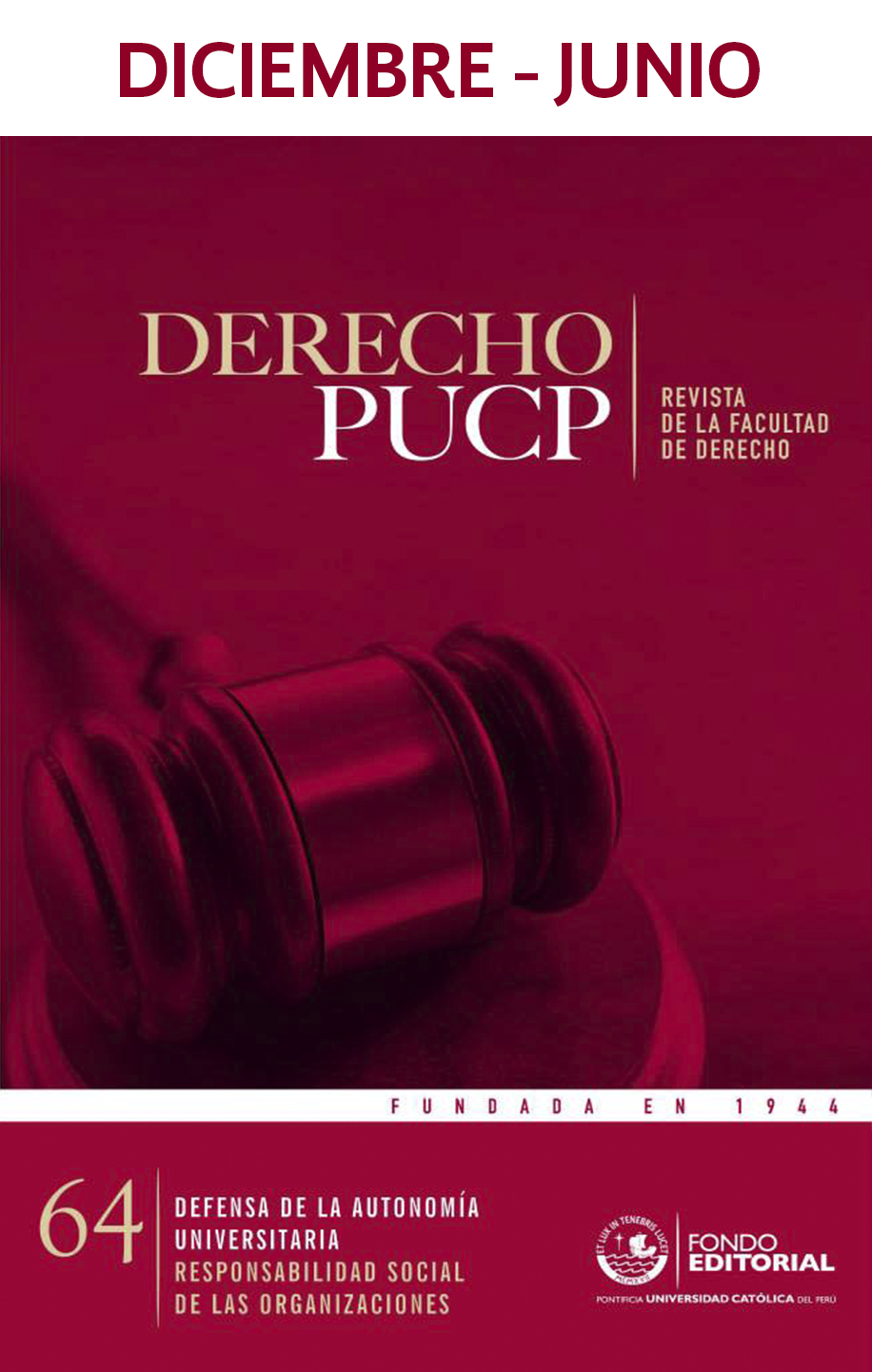La responsabilidad social corporativa en el Perú. Realidad versus discurso
DOI:
https://doi.org/10.18800/derechopucp.201001.015Palabras clave:
responsabilidad social corporativa, sostenibilidad corporativa, empresa, rentabilidad, Economía peruanaResumen
En Perú, la conciencia de la responsabilidad social corporativa (RSC), al menos a nivel del discurso, ocupa un espacio significativo. Por ello, resulta de suma importancia evaluar su puesta en práctica en atención a su realidad económica y social. Así, en este trabajo se presenta el estado del arte junto con algunas críticas importantes sobre la RSC y su noción más amplia: la sostenibilidad corporativa (partes I al IV). Por ello, el autor a lo largo del texto explorará distintas definiciones de la RSC que abarca diversas formulaciones matemáticas empleadas en la economía. Sumado a ello, se remitirá a los conceptos que sostiene el profesor Francisco Durand respecto a las diferentes economías en el Perú. Luego, se pasa a contrastar el modelo discursivo con la realidad peruana para concluir que, tal y como están las cosas, el único modelo de responsabilidad social corporativa es el friedmaniano (rentabilidad).
Descargas
Citas
Ackoff, R. L. (1999). Re-creating the corporation. Nueva York: Oxford University Press.
Alchourrón, C. y Bulygin, E. (1987). Introducción a la metodología de las ciencias jurídicas y sociales. Buenos Aires: Astrea.
Carroll, A. B. y Bucholtz A. K. (2003). Business and society: ethics and stakeholder management. Quinta edición. Cincinnati: South Western.
Durand, Fr. (2007). El Perú fragmentado. Lima: Fondo Editorial del Congreso del Perú.
Eicher, Sh. (2009). Introduction: what corruption is and why it matters. En Sharon Eicher (editora). Corruption in international business. The challenge of cultural and legal diversity. Surrey y Burlington: Ashgate Publishing Limited and Gower Publishing Company.
Elkington, J. (1997). Cannibals with forks: the triple bottom line of 21st century business. Oxford: Capstone.
Freeman, R. E. (1984). Strategic management: a stakeholder approach. Boston: Pitman Publishing.
Friedman, M. (1962). Capitalism and freedom. Chicago: University of Chicago Press
Friedman, M. (1970). The social responsibility of business to increase its profits. The New York Times Magazine,13:33
Gharajedaghi, J. (2006). Systems thinking: managing chaos and complexity. Ámsterdam: Elsevier.
Hedman, Sh. (2006). A first course in logic. An introduction to model theory, proof theory, computability, and complexity. Oxford: Oxford University Press
Keinert, C. (2008). Corporate Social Responsibility as an international strategy. Heidelberg: PhysicaVerlag.
Kolm, S. (2008). Reciprocity. An economics of social relations. Cambridge: Cambridge University Press
Kotler, P y Lee, N. (2005). Corporate Social Responsability. Doing the most good for your company and your cause. Hoboken, Nueva Jersey: John Wiley & Sons.
Leal, W y Pawlak, P. (2009). Federal Republic of Germany. Global practices of corporate social responsibility. En Samuel O. Idowu y Walter Leal Filho (editores). Heidelberg: Springer.
Murakami, Y. (2007). Perú en la era del chino. La política no institucionalizada y el pueblo en busca de un salvador. Lima: Instituto de Estudios Peruanos y Center for Integrated Area Studies.
Salzmann, O. (2008). Corporate sustainability management in the energy sector. Berlín: Gabler Edition Wissenschaft.
Vogel, D. (2005). The market for virtue: the potential and limits of Corporate Social Responsibility. Washington: Brookings Institution
Zadek, S. (2007). The civil corporation. Londres: Earthscan.
Descargas
Publicado
Cómo citar
Número
Sección
Licencia
Derechos de autor 2017 Derecho PUCP

Esta obra está bajo una licencia internacional Creative Commons Atribución 4.0.




